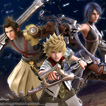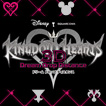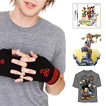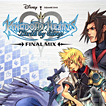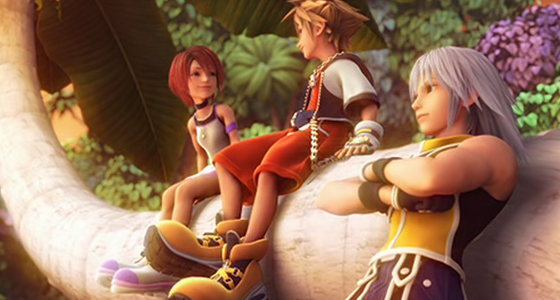Growing up in Kingdom Hearts
Whenever the developers design a main character for gamers to play as, they often design that person to be easily relatable, someone who has an open-enough personality to allow the player to slip in and become that much more immersed in the game. Square Enix has played with this concept several times, and Sora is another exercise in this, with Nomura stressing time and again that he’s an ordinary boy in extraordinary circumstances. Unfortunately, that virtue only goes as far as the player is playing the game, and sometimes not even then. One of the complaints against Kingdom Hearts is that the characters don’t really mature as they age, and we see the problem most readily in Sora, who, despite many of his extraordinary circumstances and tough challenges, seems to only become snarkier as the game advances. Because we see through his eyes most of the time, it’s easy to make that assumption. The lack of coverage on the larger portion of Kingdom Heart’s mainstay crew doesn’t help either.
Yet, it’d be unfair to say that Kingdom Hearts doesn’t have characters that grow up with the players, an argument easily defendable with the three protagonists from Birth By Sleep alone. There are plenty of characters who come to more fully understand their place in the world and relationships with people and strive to treat all things accordingly, characters who become more thoughtful about ideas and actions and maintain a level of objectivity. So, without going in any particular order, let’s look at who’s grown up the most throughout the Kingdom Hearts series.
Ventus: Taking Charge of his Destiny
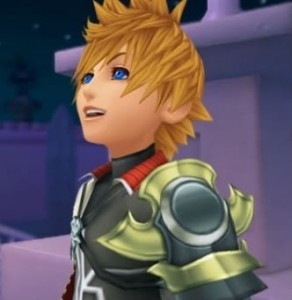
As the youngest of the team, Ven has a natural tendency to follow his admired and trusted friends. Did following in Terra\'s steps allow Ven\'s maturity to come to light?
Out of everyone in the cast, I think Ventus is the one who starts off resembling a child the most. This is noteworthy because he’s perhaps one of the characters where we can most easily see the difference between when he started and when he ended. Chronologically speaking, the earliest time we see Ventus (under Master Xehanort’s tutelage), he was very unsure of himself and somewhat reliant on others to pull him out of stressful (lethal) situations. It was that lack of confidence that also kept him from mastering the darkness while under the influence of Xehanort. While a lot of the overt signs of these issues are subdued by the start of Birth By Sleep proper, you still get the sense that he’s dependent on Terra and Aqua. Even though he shows confidence in handling fights, the larger picture still somewhat frightens him, or at least causes anxiety.
However, we see that uncertainty ebb away as he goes out into the universe after Terra. As he travels along, dealing with receiving news of Terra’s (alleged) actions to confronting the more cynical and stronger persona of Vanitas, that confidence and uncertainty disappears slowly, and you can see that the actions he takes are on his own volition as opposed to being influenced by concepts of others. By the end, we aren’t facing a boy anymore, but a young man who makes his choices and sticks to them, with a concept of friendship that evolved from having fun together to being willing to sacrifice for each other. My favourite aspect of this growth is that it’s relatively subtle storytelling, with much of his growth being shown in his demeanor and presentation. Ventus grew up in the way we’re all expected to-to take his life, his destiny, and make it his own.
Terra: Overcoming Insecurities
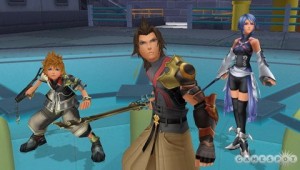
Terra is the dark horse of the team. Unsatisfied with his lack of power, he falls into the clutches of darkness to gain it. Through the darkness, Terra has shown maturity that rivals the toughest of warriros.
I’ve often said that Terra’s story is George Luca’s Revenge of the Sith done right, because it comes down to the fact he recognized his insecurities and fallacies and worked on overcoming them-albeit with a few bumps. I’m not sure what drives his lust for power at the beginning or why he’s so fixated on becoming stronger in the first place. My theory is that, with Terra being one of the older keyblade wielders and, a guy with a guy’s tendencies, he feels obligated to protect the others. He may not be conscious why he does it, he just feels lacking. Either way, the guy wants power, and that’s the openly stated problem for him. That may point to the unstated reason why he was so bothered by the result of the Mark of Mastery Exam-that one of the people he feels he has to protect has become more capable than himself. This drive is what pushes him to the darkness, but the journey along the way also opens much of his eyes to why power matters so much to him, and more importantly, why his motives needed to change.
By the end, he acknowledged that the initial drive for power had been misdirected; what’s more is that I think he realized that he didn’t absolutely have to protect his friends, seeing as they proved themselves to be strong individuals, yet he would protect them for the pure reason of that friendship. Any insecurities about his own strength and how it pertained to his former charges were gone. He understood the nature of the darkness within himself and the world around, and had it not been for the entire possession thing, I think he would have turned out much like Edmund from the Chronicles of Narnia (except for the fact that his fighting style is cooler). Sadly, righteous rage is still rage, and our boy got possessed, and then knocked into a suit of armor. Still, barring that one moment, Terra showed a great understanding of himself and the world and his responsibilities in regards to both.
Mickey Mouse: The Unsung Hero
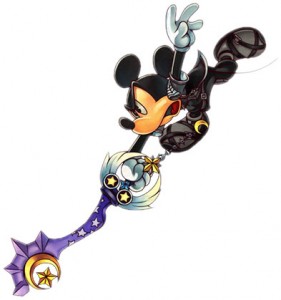
Unheard and oftentimes unseen, Mickey operates in the background. We don't see much of him, but circumstances have dictated his maturity as an essential hero.
If you’re a regular reader of the blogs here on Kingdom Hearts Ultimania, you’ll know that I had a few harsh words for Mickey in regards to the maturity of his relationship with Minnie (Mickey, why did you never visit your wife?). But while doing research on this project, I was quickly reminded of his potential to be the lead character in the game, and why that would have worked beyond the obvious reasons. Strange as it is, Mickey is one of the characters who have matured the most over the course of the KH timeline. Part of this is simply the fact that he has had the most time to do so, as he appears in every game. In the beginning, Mickey Mouse was your classic hero with the character’s lovable fallacies coming into play. Taking Yen Sid’s star shard to try and deal with the growing threat in the universe was something that any good hero would do, but his effectiveness was limited, due to his lack of control over it. This is not a negative trait, but it wasn’t partnered with the longsighted planning and understanding that follows maturity; such traits would have made him far more effective in the fight against Xehanort and could have prevented a few tragedies.
Still, we do see Mickey “grow up” as he becomes more serious about dangerous threats and treats them as threats with deep consequences rather than as a wild adventure-that growing understanding is what granted him the perception that saved Aqua from a possessed Ventus. I think at that time, Mickey comes to understand the idea of striking out at the roots of a problem as opposed to the branches of it, and spends the next ten years learning more and keeping his eyes open for trouble, which again makes him far more ready than most to act once the worlds start disappearing. The exact nature of his sacrifice to find the Dark Realm Keyblade is left uncertain, but I’ve never heard anyone dispute his role in wielding it. Mickey is actually a very serious individual in KH 2, despite still being Mickey, and he does much to strike at the heart of Organization XIII (as opposed to Sora’s waysided method of fighting the “symptoms” of the problem).
Mickey further matures by remembering that sometimes, you do need to solve things at hand, even if it’s not necessarily logical for the big picture. In fact, he probably realizes that more people get lost and go astray if they looked at the big picture for too long. Still, Mickey understands his role. To be the hero who excels in tournaments and reunites families in the jungle is important, but it takes a different kind of hero to keep things in focus and to do the less glamorous job that will win many battles later on. That said, Mickey Mouse has proven to be pretty reliable. Not bad for a childhood icon.
Roxas: Finding Yourself
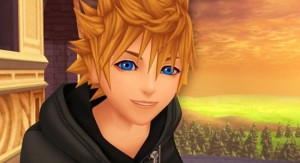
Roxas came into the world as a shell of a person-knowing nothing and thinking little. His ordeal in the series is matched by few others, and Roxas' ultimate sacrifice has gained a place in our hearts.
There’s a certain dry humor in how Roxas shows off maturity, but I feel that this summarizes why Roxas is an amazing character, irrespective of plot points. When Roxas starts off, he is a well-defined zombie, having little persona and worldly understanding shortly after he came into being. As he goes along, he gains instruction and knowledge from others, and a good part of his year becomes an interesting study in humanity for it. Roxas is a compelling character because he, like Ventus, comes into making his own choices and his own assessments-except in his case, it is much more pronounced as this development is opposed by the people around him as well as those people agreeing with him. He argues with Sa’i’x, his “commanding officer”, he makes his own guesses about why certain emotions matter, and most importantly, he reaches out the hand of friendship to Xion. He goes from having little concept of what is what to understanding morality and friendship, and most importantly, the value of sacrifice for both. He gives up his home, his role in the Organization and his life for what he knows is right, and could probably have knocked quite a few people off their pedestal. He determines who he is and what he does, on his own volition.
Now special attention must be made to the fact that he is Sora’s Nobody, and how he grows to understand himself is companionable with that truth. He demonstrates a great sense of maturity when he became confident and sure about his place, and some of that is forcefully taken away from him when Ansem blocks off some of his memories in KHII. He then has to find himself all over again, and when he does, it’s when he has to give it all up for the greater good. Again, the maturity here is found in understanding your place in life, for all that it is. Sacrificing your physical life is one thing. Sacrificing your identity (as he is is a part of Sora) is a concept most people are far more uncomfortable with. Roxas shows how he grew up by realizing that his life isn’t his, and that his place is to restore Sora, and to choose that place. That’s a heck of a sacrifice and a major change from the beginning of the game.
Riku: The Road to Dawn
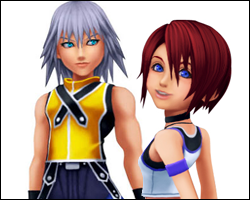
Like Mickey, Riku confined himself to act behind the scenes. He once aided the darkness, now he wields it with utmost respect to protect his childhood friends.
There’s a reason why so many fans like this guy, particularly women who place a higher value on maturity than guys do. Riku goes through so much and changes dramatically to a better person. Initially, we have a kid who is very much confident and sure in his life to warrant escape from a world he feels limited to-the small-town syndrome, I believe it’s called. When that wish is granted though, his attention does a 180 degree spin and he fixates on finding his friends and making sure they stay safe. He makes immediate and shortsighted sacrifices to do just that, again honing in on the big picture as he sees it and working strongly on that. Due to this intense focus, he backslides on a personable scale and becomes partly villainous in the first game.
Fortunately, he realizes where he goes wrong and begins to fight his demons (and Heartless Xehanort) from the inside, which helps save the day for Sora and crew. From there, he spends a year understanding and subjugating his internal darkness, learning the line of where it’s right and where it’s wrong, while looking out for his friends AND striking at the heart of the Organization’s plans. Again, Riku makes hard choices that are neither popular nor glamorous for the sake of his friends, and even endangers his identity by tapping into Ansem’s residual darkness to achieve a noble goal. I think Riku always had a certain comfort and sense of who he is, but it’s changed throughout the games to play a much larger role. Riku is the one who sees things objectively and yet still manages to keep himself close to the matter; he takes responsibility and learns not to seek the limelight like he did in KH1.
Oh, and he knows to back off from Sora and Kairi’s relationship. A hearty Kudos goes out to any person who can do that despite personal affection.
What I Got Out Of This
When I began writing, one of my first questions was “How do we define maturity?” I found out quickly that it’s a shifting standard, with people having all sorts of ideas for the subject. For me, I came to a fuller realization that I define maturity as being able to be objective, understanding, and responsible, and that the willingness to sacrifice, coupled with the wisdom to know when and why you should do so, is critical. It also reminds me of why Kingdom Hearts receives the acclamation that it does: For being a kid’s game, it says a lot about life and what we can do about it.
What do you think?
 Arcane – Maturity has many defining features and there is no correct answer. So how do you recognize maturity? Who do you believe has come the farthest to being a strong, mature character in Kingdom Hearts? Could you act like any one of these characters if you encountered the same circumstances?
Arcane – Maturity has many defining features and there is no correct answer. So how do you recognize maturity? Who do you believe has come the farthest to being a strong, mature character in Kingdom Hearts? Could you act like any one of these characters if you encountered the same circumstances?

